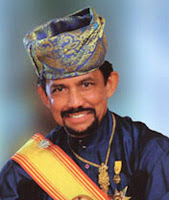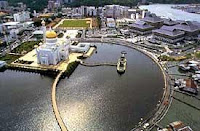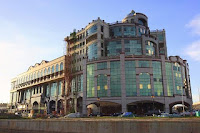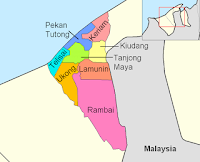Country Brief of Information About Brunei Darussalam
Geography
The Sultanate of Brunei Darussalam is situated on the
northwest coast of the island of Borneo. The capital, Bandar Seri
Begawan, lies inland on the Brunei River. Brunei occupies 5,765 square
kilometres and is divided into two parts, both of which are surrounded
by the Malaysian state of Sarawak. Relatively little of Brunei's
landmass is cultivated and around 60 per cent is covered by primary
forest.
Brunei's coastline stretches for 161 kilometres along the
South China Sea. Brunei is one of many nations with outstanding claims
regarding South China Sea boundaries.
Brunei's tropical climate is hot, humid and rainy. The
average annual temperature is 27.1°C and the country receives an
average of almost 2.9 metres of rain annually.
Population
The population of Brunei is estimated at 427,000 (2011 IMF
data), about 66 per cent of whom are ethnic Malay. A further 11 per
cent are ethnic Chinese and about three per cent are indigenous. The
relatively large population of foreign contract workers is drawn from
Indonesia, Malaysia, the Philippines and Thailand, as well as from South
Asia.
Malay is the official language, although a sizable minority
speak Chinese dialects and English is widely used in commerce,
education and government. The local variety of Malay (Kedayan or Bukit
Malay) is quite different from standard Malay.
Islam is the official religion of Brunei Darussalam and the
Islamic faith permeates the social and cultural fabric of the country.
There are minority groups of Buddhists, Christians, Hindus and a small
number of people who practise indigenous religions.
Political overview
Brunei's National Day is 23 February – a date associated
with Brunei's independence in 1984. Its political structures are
informed by the national philosophy of Melayu Islam Beraja (MIB), or
Malay Islamic Monarchy.
Brunei is constitutionally an absolute monarchy. It is
ruled by the Sultan and Yang Di-Pertuan of Brunei Darussalam, His
Majesty Paduka Seri Baginda Sultan Haji Hassanal Bolkiah Mu'izzaddin
Waddaulah, who is both the head of state and Prime Minister. He is also
the head of the Islamic faith in Brunei. His Majesty is the 29th Sultan
in one of the oldest continuous hereditary royal lines in the world.
The Sultan's eldest son, His Royal Highness Prince Haji
Al-Muhtadee Billah, was proclaimed Crown Prince of Brunei Darussalam
and heir to the throne of Brunei on 10 August 1998. Brunei achieved
internal self-government in 1959 following a period of British rule when
Sultan Omar Ali Saifuddien III (the father of the present Sultan)
assumed executive authority. However, under Brunei's first constitution
written in 1959, the country's foreign relations remained under
Britain's control.
In the District Council elections in July-August 1962, the
Brunei People's Party (PRB) won 54 of the 55 seats. Then, in a
September 1962 poll dominated by the PRB's campaign against Brunei's
proposed absorption into the planned Malaysian Federation, the PRB won
all the elected seats in the Legislative Council. The Sultan delayed
convening the Legislative Council and affirmed his intention to take
Brunei into Malaysia. In December the military wing of the PRB
revolted. The revolt was rapidly quelled with the assistance of British
troops, its leaders forced into exile and the PRB banned. The elective
provisions of the Constitution were suspended and no elections have
been held since.
Brunei ultimately declined to join the Malayan Federation
due to disagreements over financial arrangements and difficulties in
determining the rank of the Sultan among the Malay rulers.
On 4 October 1967, Sultan Omar Ali Saifuddien III abdicated
in favour of his 21 year-old eldest son, the present Sultan Hassanal
Bolkiah. Sultan Omar Ali Saifuddien III passed away on 7 September
1986.
Under a November 1971 agreement, Brunei obtained full
internal autonomy and ceased to be a protected state. Britain
continued, however, to retain responsibility for Brunei's foreign
relations and accepted a potential role in Brunei's defence. The two
countries signed a Treaty of Friendship and Cooperation in 1979
terminating the 1971 agreement. They also committed to realising full
independence for Brunei in 1984. His Majesty the Sultan of Brunei
declared Brunei's political independence from Britain on 1 January 1984
and independence from the United Kingdom was achieved on 23 February
1984.
In 1984, Brunei's Government was restructured into a formal
ministerial system with the Sultan as Prime Minister. The Sultan also
serves as Minister of Defence and Minister of Finance. He is advised
by, and presides over, four policy councils: the Council of Cabinet
Ministers, the Legislative Council, the Privy Council and the Religious
Council. The Sultan appoints the members of each of these Councils.
After a 20 year hiatus, the Sultan reconvened the Brunei
Legislative Council on 25 September 2004, appointing 21 members. His
Majesty then appointed a new Council with 29 members in September 2005.
A 24 member Legislative Council was appointed for a five year term on 1
June 2011.
The Crown Prince, His Royal Highness Prince Haji
Al-Muhtadee Billah, now holds the position of Senior Minister at the
Prime Minister's Office. The Sultan's brother, His Royal Highness Prince
Mohamed Bolkiah, is the Minister of Foreign Affairs and Trade. The
thirteen other Cabinet Ministers are not members of the royal family.
Brunei has one legal political party, the Parti Pembangunan Bangsa (National Development Party or NDP).
Brunei's judicial system reflects the strong influence of
British common law. The Supreme Court comprises the High Court and the
Court of Appeals, while the Subordinate Court consists of the
Magistrates' Courts. The Chief Justice and Judges of Brunei's Supreme
Court are sworn in by the monarch for three-year terms. The Privy
Council in London remains the final court of appeal for civil cases.
The jurisdiction of the Islamic Courts, which coexist with the Supreme
Court, is limited to family law and property matters for Muslims
including inheritance.
The royal family retains a venerated position within the
country and adverse comment regarding royal family matters is forbidden
in Brunei.
Foreign policy
Brunei's foreign policy aims to promote national policies
through bilateral and multilateral forums, by encouraging cooperation
in all fields. The goal is to contribute towards promoting peace,
security, stability and prosperity in the region, particularly by
fostering deeper understanding among countries. To this end, the
Association of Southeast Asian Nations (ASEAN) remains the cornerstone
of Brunei's foreign policy. Brunei became a member of ASEAN in 1984.
The guiding principles of Brunei's foreign policy include:
mutual respect for the territorial integrity, sovereignty, independence
and national identity of all nations; recognition of the equality of
all nations large and small; non-interference in internal affairs;
peaceful settlement of disputes and cooperation for mutual benefit.
Brunei is active in a range of regional and multilateral
forums, including Asia Pacific Economic Cooperation (APEC), the East
Asia Summit (EAS), the ASEAN Regional Forum, the ASEAN Defence
Ministers' Meeting Plus, the Asia-Europe Meeting, the Forum for East
Asia-Latin America Cooperation, and the Asia Cooperation Dialogue.
Brunei will chair ASEAN and host the EAS in 2013. It is a member of the
Organisation of the Islamic Conference and the World Trade
Organization (WTO), and joined the United Nations (UN) when it became
independent in 1984. Brunei was one of the four original members of the
2006 Trans-Pacific Strategic Economic Partnership which has the
potential to expand to include Australia, the United States, Malaysia,
Vietnam, Peru, Canada and Mexico through the Trans Pacific Partnership
Agreement (TPP) negotiations currently underway
Economic overview
Brunei's small, high-income, open economy is underpinned by
revenue from the oil and gas sector, with per capita Gross Domestic
Product (GDP) over US$38,000 in 2011. In 2010, oil and gas accounted
for around 60 per cent of Brunei's GDP. Brunei's extensive foreign
investments form a large, yet unreported contribution to the national
budget.
Small scale manufacturers and primary production (including
agriculture, fisheries and forestry) make up the rest of Brunei's
economy. Brunei imports nearly all of its major manufactured products
and nearly 90 per cent of its total food requirements.
Despite Brunei's high dependence on oil and gas, this
sector employs only three per cent of the workforce. The public sector
is by far the largest employer of Brunei's population, providing
employment for over half the workforce.
Brunei has a low tariff regime and no capital gains or
personal income tax, although private businesses pay company tax.
Company tax for oil and gas exploration and production companies is 55
per cent. For all other companies it is 22 per cent. Brunei's monetary
policy and banking regulation is administered by the Brunei Monetary
Authority (AMBD), created in 2011, and the Brunei Dollar (BND) is
pegged to the Singapore Dollar. Both currencies are legal tender in
Brunei and Singapore.
The Brunei Government aims to diversify the economy away
from heavy dependence on oil and gas by promoting private non-energy
sector development and attracting more non-oil and gas related
investment. The Brunei Economic Development Board (BEDB) was formed in
November 2001 to stimulate the growth, expansion and development of the
economy by promoting Brunei as an investment destination and
facilitating diversification projects.
In January 2008, the Brunei Government released its Vision
2035 (Wawasn 2035) , which sets out the overarching goal of delivering
economic diversification by 2035 and the broad development strategies
which Brunei will pursue over this period. Five year National
Development Plans (RKNs) then set out detailed project and budgets for
delivering Vision 2035. The RKN for the period 2012 to 2017 was
announced in April 2012 and it continued to target an annual growth
rate of 6 precent over the life of the Plan.
Recent economic performance
The global economic crisis had limited impact on Brunei,
mainly due to limited global exposure in its capital markets. The fall
in oil prices following the global economic crisis and subsequent
decline in energy production saw Brunei's GDP contract by 1.9 per cent
in 2008 and 1.8 per cent in 2009. Brunei saw a return to positive growth
with GDP increasing by 2.6 per cent in 2010 and 2.2 per cent in
2011, due in part to more favourable external conditions and the large
fiscal and current account surpluses built up in recent years.
Brunei's domestic banks are adequately capitalised and
profitable. Banks are also highly liquid, with more than half of total
deposits parked abroad. Further stability was provided by the
Government's October 2008 guarantee of all Brunei-dollar and foreign
currency deposits until the end of 2010. This measure has since been
replaced by long term deposit protection under the Brunei Deposit
Protection Corporation.
Economic outlook
Brunei's heavy dependence on the oil and gas sector means
that its economy is highly vulnerable to fluctuations in oil and gas
prices. This dependence looks set to continue in the medium term.
Brunei's existing oil and gas reserves were expected to
last for at least the next two decades. A phase of extensive new
exploration and investment in enhanced recovery has commenced which
includes the development of two major new offshore deep-water blocks.
While it is still too early to determine precisely the size of any new
reserves, the Brunei Government's Energy White Paper had set the
ambitious target of a doubling of Brunei's daily oil and gas production
by 2035.
Australia-Brunei bilateral relations
Australia and Brunei enjoy a warm relationship dating back
to well before 1959, when Brunei achieved internal self-government. The
relationship has strengthened in recent years, with growing links
across a range of areas including defence and security, education and
trade.
Brunei is an important partner for Australia in the
Commonwealth, APEC, the EAS, the Trans-Pacific Partnership
negotiations, and multilateral organisations like the UN and WTO. Brunei
was the ASEAN Coordinator in negotiations for the ASEAN-Australia-New Zealand Free Trade Agreement (AANZFTA), which was signed in Thailand on 27 February 2009 and entered into force on 1 January 2010.
In June 2005, Brunei's Foreign Minister, His Royal Highness
Prince Mohamed Bolkiah, agreed to an Australian proposal to erect a
permanent memorial to mark the 1945 landings in Brunei of the
Australian force, which ended Japanese occupation and commenced
reconstruction. A delegation of Australian veterans, led by the then
Minister for Veterans Affairs, the Hon Alan Griffin MP, travelled to
Brunei to attend the inauguration ceremony for the memorial in December
2008.
Australia is developing a strong education and training
relationship with Brunei. It is keen to facilitate linkages between
Australian and Bruneian education institutions, including increasing
the number of Bruneian students undertaking Australian tertiary
courses.
Defence and security links
Australia has a strong Defence relationship with Brunei,
with avenues of engagement including strategic dialogue, bilateral
military exercises and technical assistance. Military exercises
conducted with the Royal Brunei Armed Forces include reciprocal army
and navy exercises. Australia also provides some training and military
expertise.
On 15 February 2005, Australia and Brunei signed a
Memorandum of Understanding (MOU) on Cooperation to Combat
International Terrorism during the visit to Australia by His Majesty the
Sultan of Brunei. The MOU provides for cooperation on customs,
finance, immigration, intelligence, law enforcement, security and
transport. During then Australian Federal Police Commissioner Mick
Keelty's visit to Brunei in May 2008, the two countries signed an MOU
on combating Transnational Crime and Developing Police Cooperation.
Bilateral visits
His Majesty the Sultan of Brunei made his first official
visit to Australia in February 2005, visiting again in September 2007
for the APEC Summit in Sydney and in October 2011 to attend the
Commonwealth Heads of Government Meeting in Perth. The Governor-General,
Ms Quentin Bryce, visited Brunei on 2-4 October 2012.
The Second Minister for Foreign Affairs and Trade, Pehin
Dato Lim Jock Seng, and Minister for Energy in the Prime Minister's
Department, Pehin Yasmin, visited Australia in July 2012. In August
2008, Brunei's Minister for Education visited Australia and in March
2009, the Deputy Minister of Education also visited. Brunei's second
Minister for Defence, Dato Paduka Haji Mustappa bin Haji Sirat, visited
Australia in February 2012.
The Parliamentary Secretary for Pacific Island Affairs and
Foreign Affairs, the Hon Richard Marles MP, visited Brunei in August
2012. The Parliamentary Secretary for Sustainability and Urban Water,
Senator the Hon Don Farrell, visited Brunei in October 2010 to attend
the second EAS Environment Ministers' Meeting. Minister for Resources
and Energy, the Hon Martin Ferguson AM MP, visited Brunei in September
2011 to attend the fifth EAS Energy Ministers' Meeting.
Bilateral economic and trade relationship
Brunei was ranked as Australia's 35th largest merchandise
trading partner in 2011-12, though this ranking likely understates the
level of transhipped trade between Australia and Brunei via Singapore.
Trade and investment is an important focus of Australia's
bilateral relationship with Brunei. Total direct bilateral trade with
Brunei in 2011-12 amounted to $1.38 billion, with Australia's imports
of crude petroleum from Brunei comprising just over $1.34 billion.
Australia's merchandise exports to Brunei in 2011 totalled $37 million,
consisting mainly of food and food products including meat excluding
beef ($5 million), live animals ($5 million), beef ($3 million) and
specialised machinery and parts ($3 million).
In the services sector, a number of Australian teachers and
other professionals work in Brunei. In 2011-12, Australia's service
exports to Brunei (mainly education) were worth $45 million. Australia
is now the second preferred destination for Bruneian students.
Australian trade and investment strategies
The ASEAN-Australia-New Zealand Free Trade Agreement
On 27 February 2009, the former Minister for Trade Simon
Crean joined trade ministers from the ten member states of ASEAN
(including Brunei) and New Zealand in signing the ASEAN-Australia-New Zealand Free Trade Agreement (AANZFTA) in Thailand. As lead ASEAN Coordinator in the negotiations, Brunei played an important role in securing this Agreement.
Export opportunities
There are good trade and investment opportunities in Brunei
including in the oil and gas, education, food and agriculture,
financial and service sectors.
Australian Trade Commission (Austrade)
Austrade has identified potential opportunities for
Australian suppliers of goods and services in a number of sectors.
Austrade's Brunei country page has general information on doing business and on specific export opportunities. Austrade Brunei can also provide advice on accessing opportunities in Brunei.
Australia-Brunei Darussalam Business Council
The Australia-Brunei Darussalam Business Council (
ABDBC)
was established in 1994 in response to the growing interest in trade
and investment between Australia and Brunei. The Council's objectives
are to foster friendship and understanding between the business
communities of both countries, promote technical cooperation, trade,
investment and tourism, and facilitate the development of new business
strategies to enhance the bilateral business relationship. The
ABDBC's founder and President is Mr Francis Wong. The contact details for the
ABDBC are:
- Ph: 618 8221 5722
- Fax: 618 82215001
- Address: 63 Grote St, Adelaide, South Australia, 5000




































